You want more people to buy what you sell, but they seem unsure. They see your stuff but don’t trust it enough to buy.
This is a big problem! You’re losing customers, and it’s frustrating. You’ve tried to make your business look good, but it’s not working. You feel like nobody believes you.
What if you could easily show people that others love your business? That’s where customer stories come in.
In this post, we’ll show you 20 simple testimonial examples of good customer stories that will make people trust you and buy your stuff.
Let’s learn how to use these stories to get more customers.
Why are Testimonials Effective?
Here are a few statistics to prove my point:
- Adding a testimonial to your sales page can increase conversions by 34%.
- 51% of business buyers rely on personal recommendations when deciding what to purchase.
- Regularly featuring customer testimonials on your product page can boost your annual revenue by 62%.
- 71% of customers purchased a company’s product or service after watching a video testimonial.
Here is the source: 12 Must-Know Testimonial Statistics
These are just a few studies highlighting why testimonials are so effective.
Visitors leave your website without taking action?
They don’t trust your site or feel urgency to act. WiserNotify builds both, turning doubt into action & visitors into customers.
Different Types of Testimonials
Various types of testimonials can help build trust with potential customers:
Quote testimonials
These are written testimonials featuring direct quotes from satisfied customers.
They provide concise endorsements highlighting specific benefits or positive experiences with your product or service.
Video testimonials
Video testimonials showcase real customers sharing their experiences on camera.
They add authenticity and allow potential customers to connect with actual users who have benefited from your offerings.
Case studies
Case studies are detailed accounts of how your product or service solved a customer’s problem.
They demonstrate tangible results and success stories, providing in-depth examples that resonate with prospective customers.
Social media testimonials
These testimonials come from positive reviews or mentions on social media platforms.
Sharing user-generated content adds authenticity and shows how existing customers are engaging with your brand online.
Peer testimonials
Peer testimonials feature customers similar to your target audience in industry, role, or challenges faced.
They resonate by showing relatable success stories, helping potential customers see how your product can meet their specific needs.
Influencer testimonials
Influencer testimonials involve endorsements from industry experts or well-known figures.
They leverage the influencer’s credibility and reach to enhance your brand’s visibility and trustworthiness.
10 Best Customer Testimonial Examples
Client testimonial examples are powerful social proof that helps you convert prospective customers into buyers and increase sales.
However, not all customer testimonials are the same.
Here are the 10 Best customer testimonial examples; you can take inspiration and convert audiences into customers.
1. Dialpad’s Case Study
 Dialpad is an AI-powered communication platform that allows teams to streamline their communication efforts and house all their channels in one place.
Dialpad is an AI-powered communication platform that allows teams to streamline their communication efforts and house all their channels in one place.
On their website, they have displayed customer testimonials and showcased how real businesses have benefited from using Dialpad’s solutions.
The layout is visually appealing, with professional images that convey productivity and collaboration.
Mentioning recognizable companies like Xero and PagerDuty adds credibility through brand association.
Readers can learn the importance of using concrete metrics and brand partnerships to build trust.
Related: Easiest Ways to Display Testimonials on Website for Success
2. Timothy Sykes Trustpilot
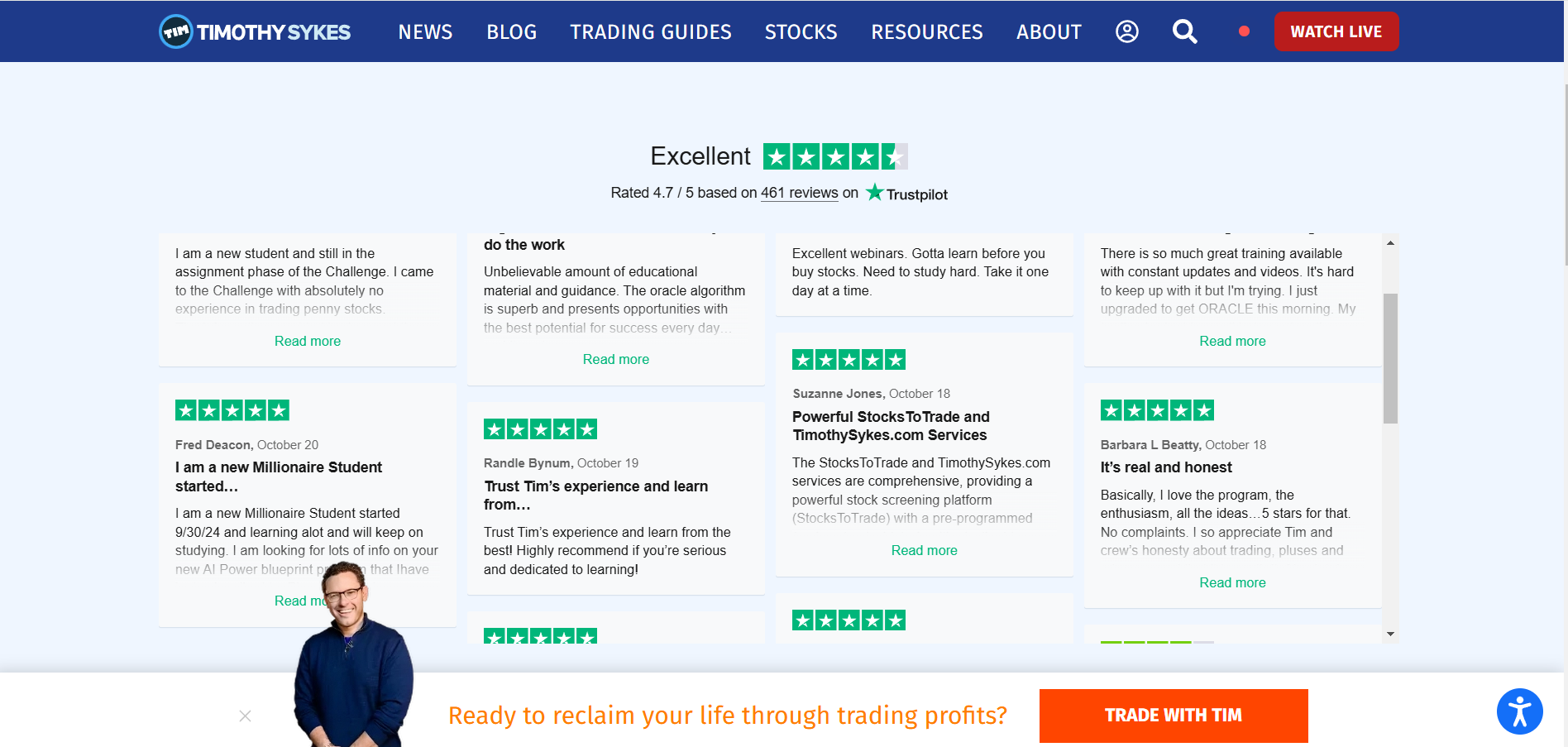 Timothy Sykes’s website features a testimonial section with customer reviews sourced from Trustpilot, which helps to build credibility among audiences.
Timothy Sykes’s website features a testimonial section with customer reviews sourced from Trustpilot, which helps to build credibility among audiences.
Trustpilot is a highly regarded review site; high ratings build the audience’s confidence to take the next step.
The review highlights the customer’s experience and showcases the results they achieve during the course.
A key takeaway is integrating verified reviews with specific details to boost credibility.
Highlighting the ratings and relatable user experience helps to build trust and engagement.
3. Ahrefs Customer Quotes
 Ahref’s website features customer testimonials to demonstrate the value of their SEO tools across different industries.
Ahref’s website features customer testimonials to demonstrate the value of their SEO tools across different industries.
These quotes are catchy, specific, direct, and inspiring. They highlight how users have benefited from using Ahrefs to boost their search traffic and make data-driven decisions.
These customer quotes help to build trust, satisfaction, and enthusiasm with statements from recognized companies and owners.
The key takeaway is the importance of using segments of audiences’ testimonials to make them more relatable and impactful.
Highlighting customer quotes adds a touch of confidence and personality.
Don’t Miss: 10 Powerful Testimonial Software for Social Proof That Converts
4. Famewall’s Video testimonials
 Famewall is a tool that helps businesses and coaches collect testimonials in text and video formats.
Famewall is a tool that helps businesses and coaches collect testimonials in text and video formats.
The video testimonials on Famewall’s website from different customers build trust and demonstrate the value of a product or service.
It offers multiple testimonials, helping viewers find relevant feedback quickly.
Using video testimonials adds authenticity and personal connection, allowing potential customers to hear and see feedback from real users.
The testimonial’s inclusion of a diverse group of people, from a content creator to coaches and founders, makes it relatable.
The key takeaway is that a video testimonial is highly effective in building credibility and highlighting customers’ profiles and categories to ensure they resonate with potential customers.
5. Dollar Shave Company Customers Quotes
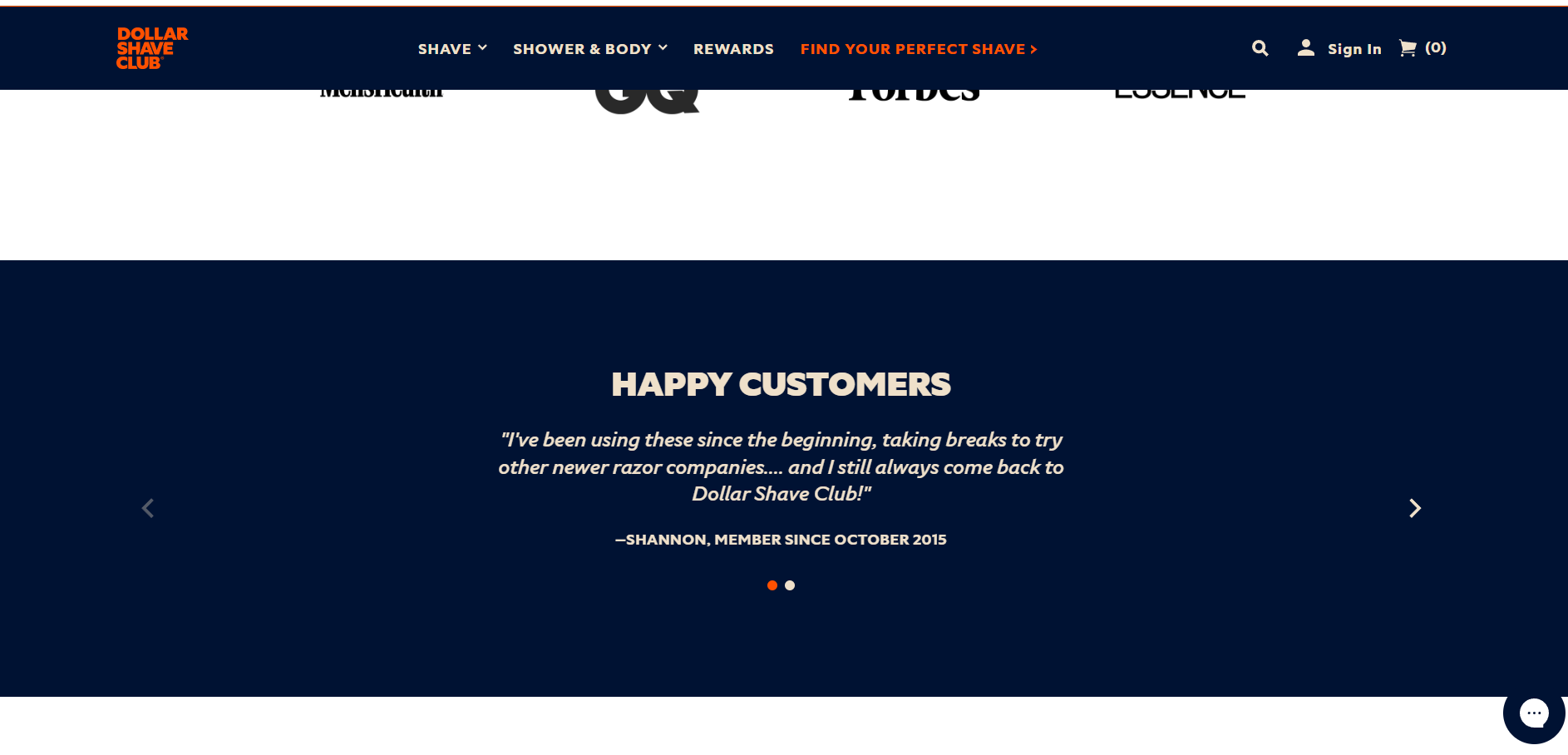 Dollar Shave Company shows happy customer reviews on its website, which showcases customer loyalty and satisfaction.
Dollar Shave Company shows happy customer reviews on its website, which showcases customer loyalty and satisfaction.
The quote highlights the customer’s long-term relationship with the brand, expressing that despite trying other razor companies.
The testimonial evokes reliability and trust, suggesting that the brand consistently delivers value, encouraging customer retention, and reassuring new customers that the brand is a dependable choice.
A key takeaway is that loyalty-focused customer testimonials highlight long-term customer bonds, build credibility, and show that the brand delivers lasting satisfaction.
Build trust & FOMO
Highlight real-time activities like reviews, sales & sign-ups.
6. Shopify’s Video Case Study
Case studies are suitable for building trust and showcasing how your product or service can help customers achieve their goals and results.
Shopify’s video case study is more engaging and relevant. It connects with customers and highlights how it helped them solve problems.
The LinkedIn case studio from Shopify highlights the key points and the customer’s story, which connects with the audience more emotionally.
These video testimonials add authenticity and build trust among new audiences, influencing them to take action.
The key takeaway is that video testimonials can help build trust and credibility and resonate with the right audiences looking for the same goals or results.
Get to Know: How to Effectively Manage Testimonials for Maximum Impact
7. Freehand by Invision Customer Stories
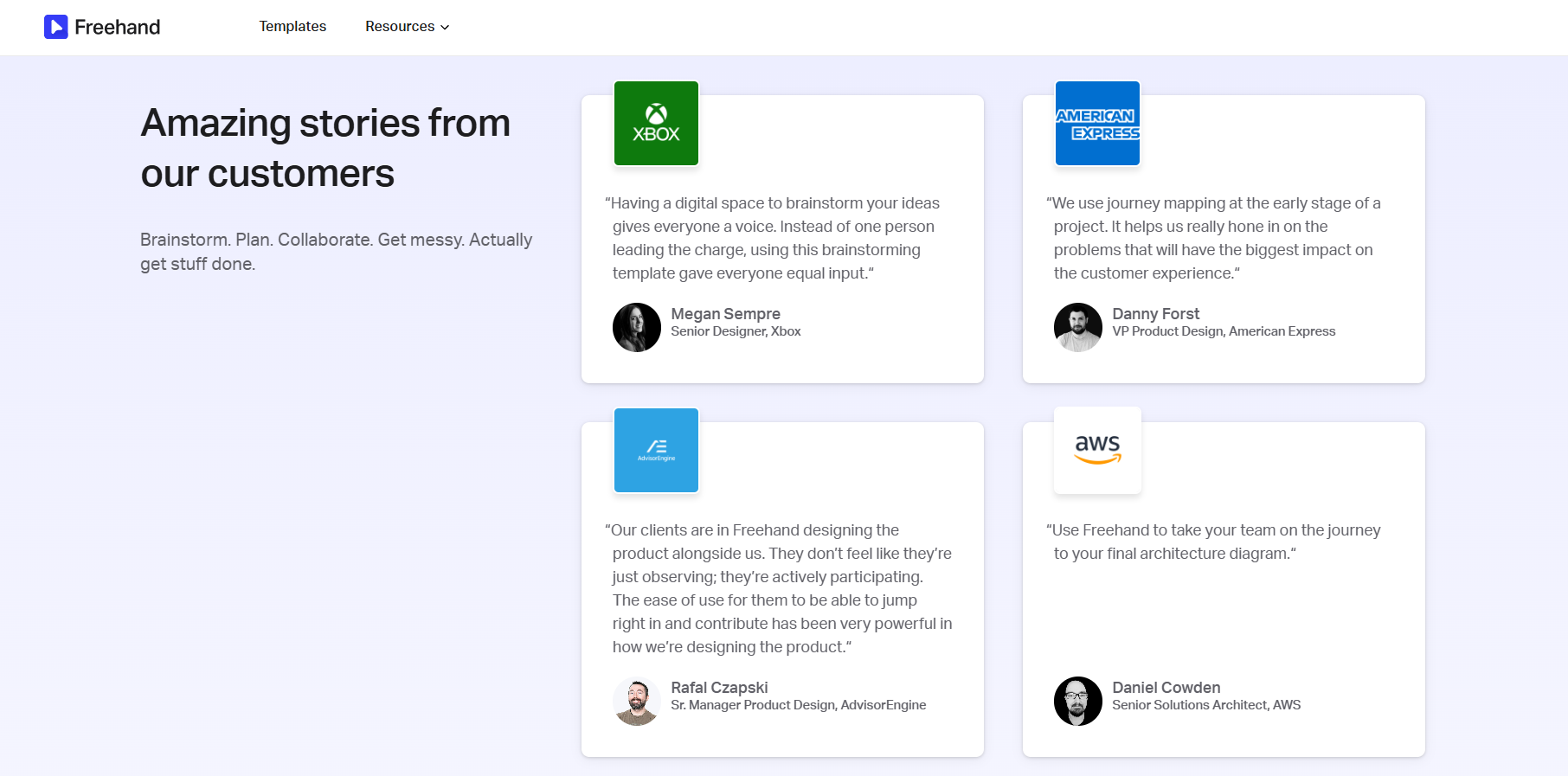 The customer stories used on the website by Freehand build trust and demonstrate the product’s effectiveness through social proof.
The customer stories used on the website by Freehand build trust and demonstrate the product’s effectiveness through social proof.
This section appears on Freehand’s website and focuses on customer stories that, by sharing testimonials from well-known brands, are likely to attract new users.
These testimonials highlight specific use cases and benefits, making them relatable for potential customers.
The quotes evoke emotions like collaboration, innovation, and efficiency, which resonate with designers and teams.
The key takeaway is that showing well-known brand testimonials helps boost your credibility, create customer value, and build a deeper connection with your audiences.
8. Blue Apron’s Social Media Posts
 The Instagram post by Blue Apron features Chef Alex & Olivia showcasing the playful cooking session.
The Instagram post by Blue Apron features Chef Alex & Olivia showcasing the playful cooking session.
The caption highlights a collaborative recipe with chef Roy Yamaguchi, encouraging viewers to learn a new cooking technique.
The post is compelling and attracts foodie audiences looking for new recipes, making content more relatable, fun, and memorable.
User comments reinforce the positive experience by mentioning how easy and delicious the meals are, contributing to social proof.
The key takeaway is combining fun elements with informative content and testimonials to engage the audience.
9. Bamboo HR
 The customer testimonials section from Bamboo HR’s website shows positive reviews from professionals across various industries.
The customer testimonials section from Bamboo HR’s website shows positive reviews from professionals across various industries.
It highlights key benefits such as time savings, simplified payroll management, and enhanced HR collaboration.
The page aims to showcase positive feedback from customers who have used BambooHR, an HR software solution. It emphasizes the product’s ease of use, value, and impact on businesses.
This testimonial page effectively conveys BambooHR’s positive impact on businesses. It combines text, images, and logos to create a compelling and persuasive message.
The key takeaway is that sharing user-generated testimonials that are specific, quantifiable benefits in testimonials boosts credibility.
10. Harry’s Peer Review Sites
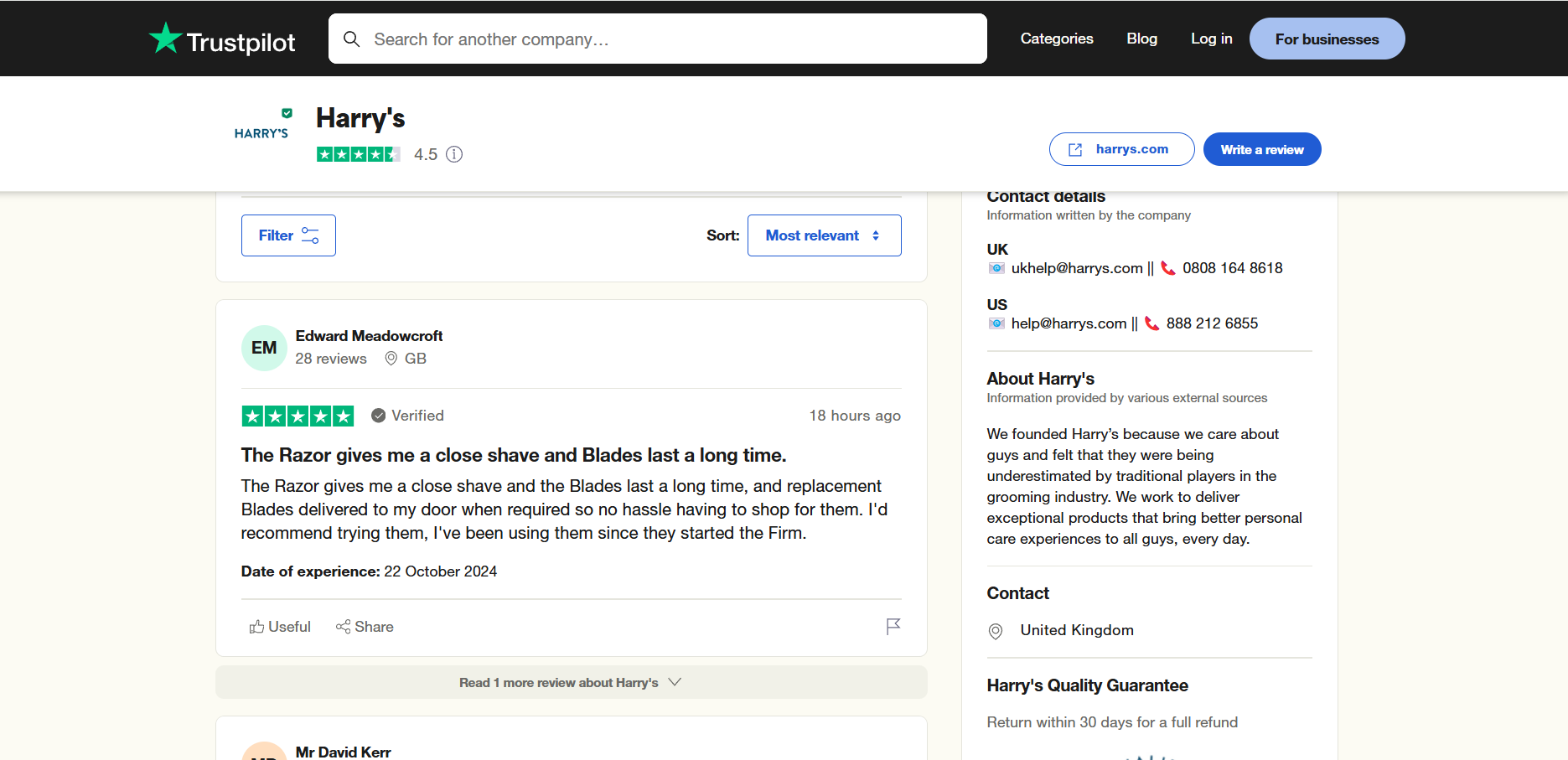 The image shows Harry’s customer reviews, highlighting customers’ positive experiences with the brand’s products.
The image shows Harry’s customer reviews, highlighting customers’ positive experiences with the brand’s products.
Consumer testimonials on review sites, such as Trustpilot, build trust by showcasing the quality of the product and the value of convenience.
In addition, the verification badge further enhances credibility, reassuring potential customers that the feedback is authentic.
The key takeaway here is the effectiveness of simple, genuine reviews that focus on specific product benefits and convenience.
The written testimonials help potential customers feel confident about trying out the product.
Build trust & FOMO
Highlight real-time activities like reviews, sales & sign-ups.
10 Best Testimonial Page Examples
Your customer’s testimonials page is a dedicated section on a website or landing page where businesses showcase feedback, reviews, or success stories shared by their customers.
The testimonial pages typically contain written reviews, star ratings, video testimonials, case studies, or social media mentions that highlight positive experience with the brand’s products or services.
Here are 10 Best Testimonial page examples to get inspiration to build your own.
1. The Farmer’s Dog
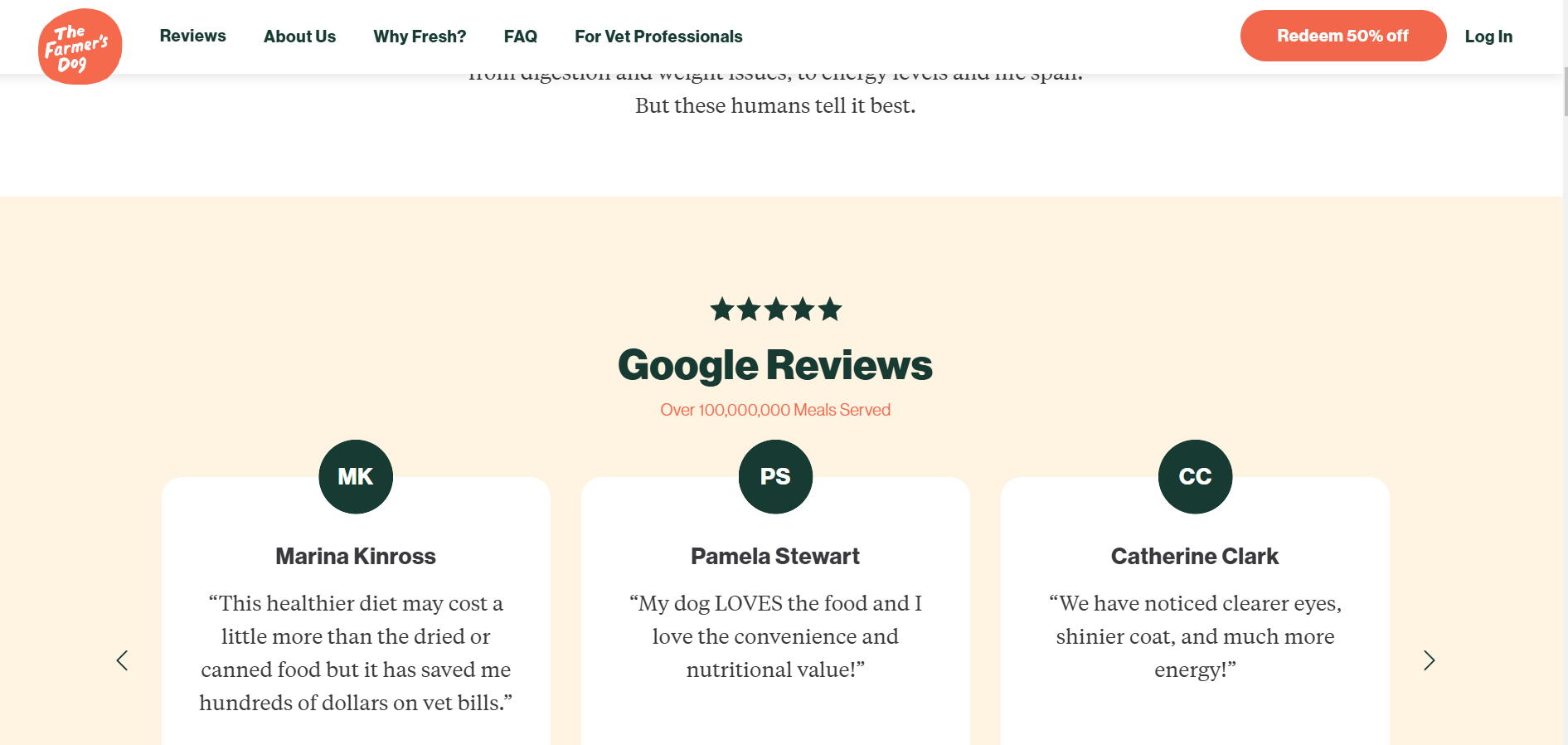 The Farmer’s dog review page highlights customer experiences with their fresh dog food service, focusing on health benefits, improved energy, and convenience.
The Farmer’s dog review page highlights customer experiences with their fresh dog food service, focusing on health benefits, improved energy, and convenience.
The page has compelling customer testimonials in different formats, including written and video ones.
They have also added the value of testimonials from expert veterinarians, which build trust with their audience.
This user-centric design helps prospective customers easily find relevant reviews, reinforcing the brand’s credibility.
The variety of testimonials and focus on specific benefits make the page a compelling example of customer-driven marketing.
2. MixPanel
 Mixpanel’s testimonial page presents customer feedback through engaging, sliding cards.
Mixpanel’s testimonial page presents customer feedback through engaging, sliding cards.
It highlights authentic opinions from individual users and well-known companies, like Yelp and Ticketmaster, boosting credibility.
The design is eye-catching, drawing visitors to explore why users value the product, with a mix of positive reviews focusing on analytics and usability.
This interactive presentation helps keep potential customers engaged while building trust.
3. UpRight
 Upright’s testimonial page excels by featuring various formats, including written, video, and social media reviews.
Upright’s testimonial page excels by featuring various formats, including written, video, and social media reviews.
It shows real users wearing the product, creating authenticity and reliability.
This multi-format approach caters to different visitor preferences, enhancing engagement.
Including personal experiences makes it easy for potential customers to visualize how the product fits into their lifestyle, contributing to trust and credibility.
4. Bonsai
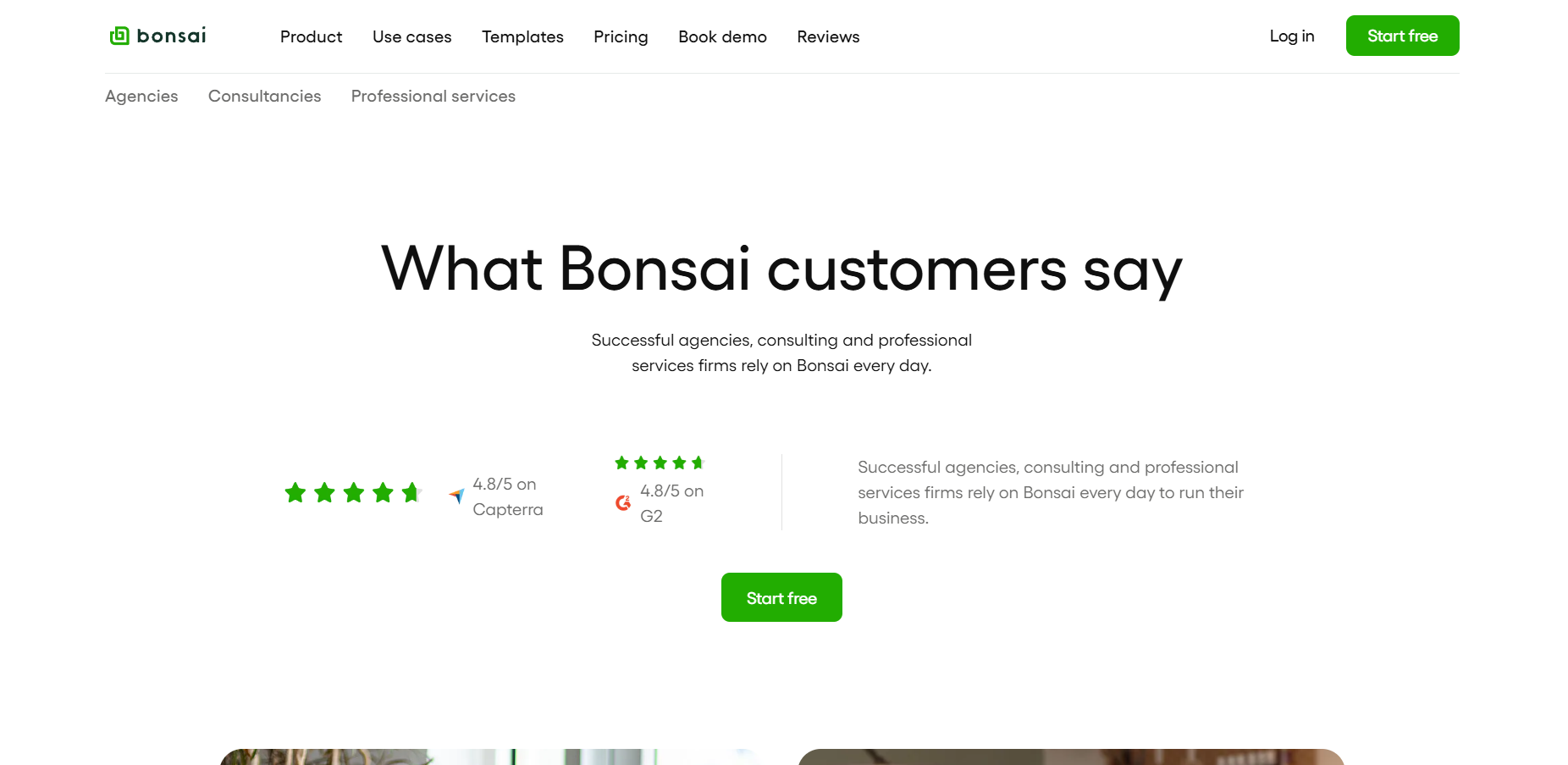 Bonsai’s testimonial page presents customer feedback with a clean, modern design that is easy to browse.
Bonsai’s testimonial page presents customer feedback with a clean, modern design that is easy to browse.
It features multiple formats, including text and video reviews, to engage different types of visitors.
The testimonials highlight how professional agencies, consultants, and service firms benefit from Bonsai’s software.
Ratings from platforms like Capterra and G2 add credibility, reinforcing trust in the product.
This approach makes the page visually appealing and informative, helping potential customers quickly find relevant insights.
5. Patriot Software
 Patriot Software’s testimonial page has a clear structure, mixing video and written reviews.
Patriot Software’s testimonial page has a clear structure, mixing video and written reviews.
It features real customers sharing their experiences with accounting and payroll software, showcasing the product’s ease of use, affordability, and responsive customer support.
The page allows visitors to view testimonials by product category, adding relevance.
Combining carousels and grids offers a smooth browsing experience, enhancing engagement.
This design exemplifies the effectiveness of testimonial galleries in building trust.
Build trust & FOMO
Highlight real-time activities like reviews, sales & sign-ups.
6. Calamari
 The next example is Calamari’s testimonial page, which highlights honest feedback from renowned global brands like UNICEF and Virgin Hotels. It makes it clear how diverse teams use the platform to streamline their HR processes.
The next example is Calamari’s testimonial page, which highlights honest feedback from renowned global brands like UNICEF and Virgin Hotels. It makes it clear how diverse teams use the platform to streamline their HR processes.
The page builds trust with client logos and provides immediate options to start a free trial or book a demo, creating a seamless path for new customers.
With its focus on success stories and practical value, the page engages visitors and shows how Calamari can effortlessly fit into their workflow.
7. DevRev
 The testimonial page from DevRev features the logo of its clients and customer feedback showcasing accurate results. Showing the audience the results they will get after using the software, such as a “30% increase in ticket resolution speed, 50% increase in workflow efficiency, and 70% faster migration process,” builds deeper connections and drives conversions.
The testimonial page from DevRev features the logo of its clients and customer feedback showcasing accurate results. Showing the audience the results they will get after using the software, such as a “30% increase in ticket resolution speed, 50% increase in workflow efficiency, and 70% faster migration process,” builds deeper connections and drives conversions.
It helps them to build trust and credibility among the audiences by showing the customer’s testimonials, trusted company logos, and badges. The precise, data-backed results make the platform’s value tangible, appealing, and more approachable.
Moreover, the addition of clear CTAs, such as booking a demo or starting a free trial, influences customers to take action.
8. Lumen
 Lumen’s testimonial page effectively tackles the challenge of explaining their tech-driven product by showcasing diverse reviews.
Lumen’s testimonial page effectively tackles the challenge of explaining their tech-driven product by showcasing diverse reviews.
It uses a mix of testimonials, including testimonial videos, user-generated content, short text reviews, and expert endorsements, boosting credibility.
Featuring real user experiences helps demonstrate how Lumen supports metabolic health.
The concise testimonials are engaging and strategically placed alongside calls to action, encouraging visitors to try the product.
This dynamic layout builds trust and simplifies the product’s complexity for potential customers.
9. Casper
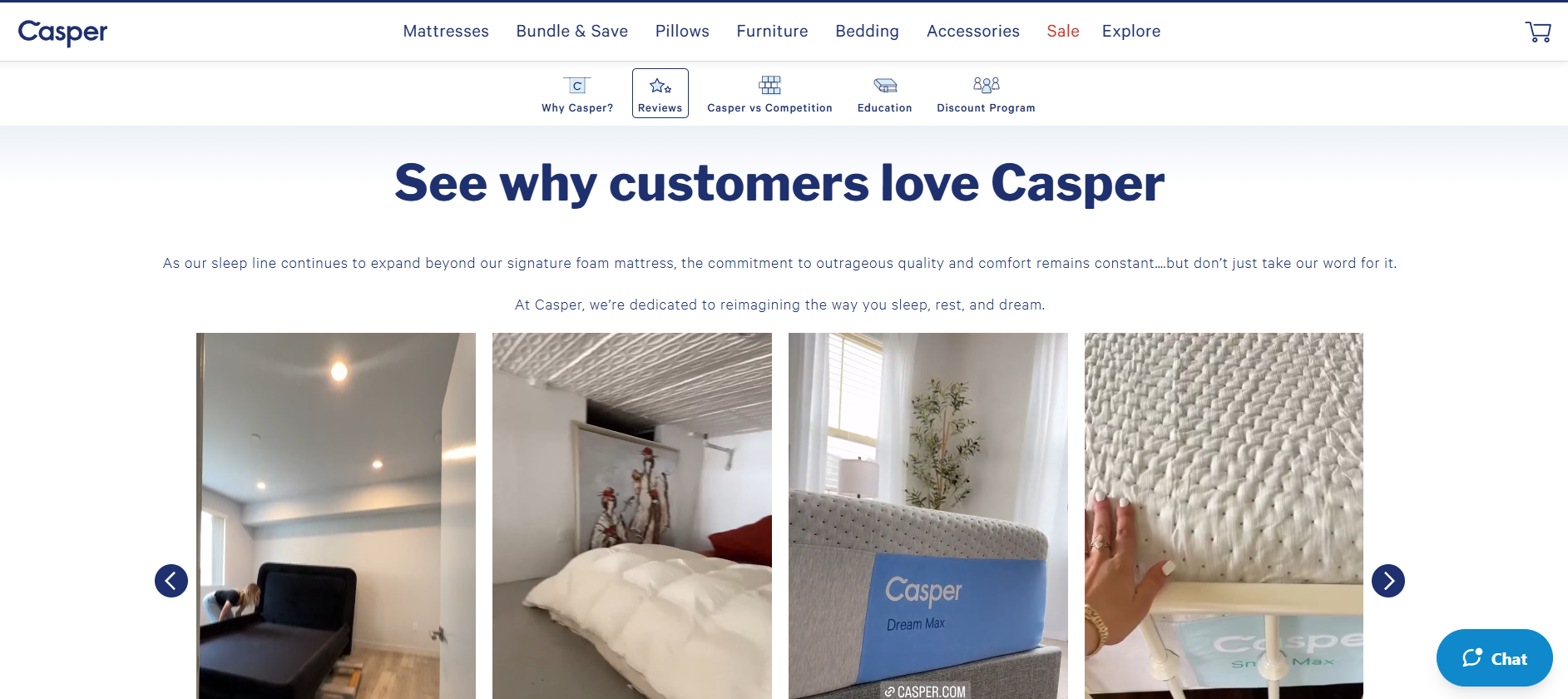 Casper’s testimonial page brings customer stories by leveraging storytelling and social proof.
Casper’s testimonial page brings customer stories by leveraging storytelling and social proof.
The brand builds trust and credibility by showing existing customers enjoying their products.
Videos of real users enjoying their mattresses add authenticity, connecting visitors to relatable experiences.
The page isn’t just about mattresses—it’s about comfort, better rest, and the joy of creating a perfect sleep environment.
Casper’s approach humanizes the brand by focusing on everyday moments, inviting potential buyers to imagine how their sleep, mornings, and routines could improve.
It’s not just a mattress—it’s a lifestyle upgrade.
10. Appraisd
 Appraisd’s testimonial page combines a strong visual element with a clear message.
Appraisd’s testimonial page combines a strong visual element with a clear message.
With global businesses ranging from startups to enterprises using Appraisd, the page establishes trust by showcasing strong ratings on Capterra and G2.
This approach creates a compelling and persuasive testimonial page that resonates with potential users.
The friendly visuals of diverse users worldwide emphasize the platform’s broad reach and human touch.
It invites visitors to explore further with a straightforward call to action for demos and trials, aligning testimonials with real-world impact.
Also see: 27 Social Proof Examples from Top Brands (You Can Steal)
How to Get a Good Testimonial
Getting good testimonials requires planning:
1. Find Happy Customers: Reach out to customers who are happy with your product or service. Happy customers are more likely to give good and genuine testimonials.
2. Make It Easy: Make the process simple by providing clear instructions or prompts. Whether you’re collecting text testimonials, video testimonials or social media testimonials, make it easy for them.
3. Ask Specific Questions: Ask customers to mention specific features or benefits they liked. This gives you more powerful customer testimonials that shows what sets you apart.
4. Offer Options: Give customers the chance to submit written testimonials, record video testimonials or provide feedback through interviews. Multiple testimonials in different formats will appeal to a wider audience.
5. Get Permission: Always get explicit permission before using a customer’s testimonial in your marketing materials or on your website. This is important for legal reasons when using client testimonials.
6. Say Thanks: Thank customers for their time and feedback. Showing appreciation will strengthen your relationship with existing customers and get more testimonials in the future.
How Wisernotify Build Trust and Convert
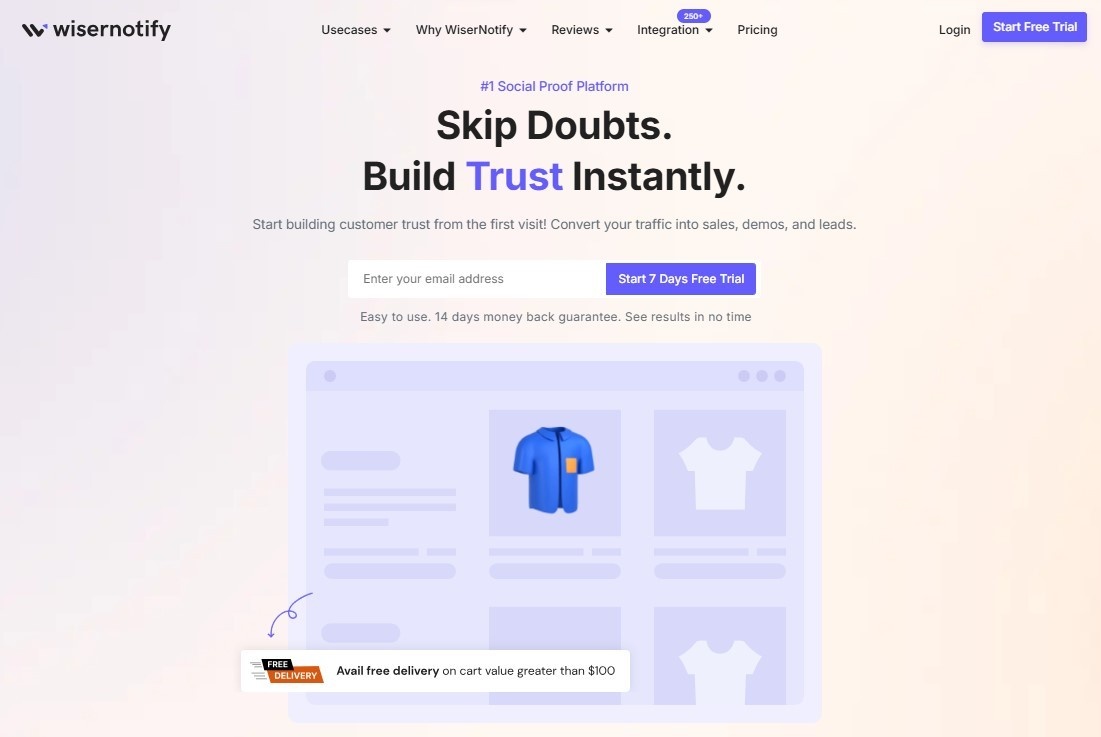
Wisernotify is a social proof and FOMO tool that helps businesses use social proof, reviews and testimonials to build trust and convert.
By showing real-time notifications of customer activities such as recent purchases, testimonials, reviews, countdown timers or sign-ups, Wisernotify creates a sense of urgency and credibility.
It integrates with your website to show real testimonials, online reviews and user-generated content.
With Wisernotify you can:
- Show customer testimonials and positive reviews to build instant trust.
- Create a countdown timer
- Customize the design to match your brand for better user experience.
- Track the performance of your social proof campaigns to improve results.
By using Wisernotify in your marketing you can show happy customers’ experiences and influence potential customers’ decisions.
Where to put testimonials?
Placing testimonials strategically will give you more impact:
Homepage: Show great testimonials to make a strong first impression.
Product or Service Pages: Show specific testimonials related to the product or service to address potential customers’ concerns.
Testimonials Page: Create a testimonials page where visitors can see multiple testimonials and success stories.
Landing Pages: Use testimonials on landing pages to back up your message and increase conversions.
Blog Posts: Add customer stories or quotes to your blog posts to add credibility.
Paid Ad Campaigns: Use testimonial ad examples in your marketing campaigns to attract potential customers.
By placing testimonials across your marketing touchpoints you’ll build social proof and get more customers to engage with you.
How to Write Good Testimonials?
Writing great testimonials means capturing honest and meaningful feedback from your happy customers.
Good testimonials will influence potential customers by showing real experiences and success stories with your product or service.
How long should a testimonial be?
A testimonial should be short and sweet; for written testimonials, aim for 50 to 100 words.
This length allows customers to highlight specific points without overwhelming the reader.
For video testimonials, 1 to 2 minutes is ideal.
This length is long enough to get the key points across without losing the viewer’s attention.
The goal is to provide enough information to be persuasive without boring the potential customer.
What should a testimonial have?
A good testimonial should have:
Customer’s Experience: A brief description of their situation before using your product or service.
Specific Benefits: Details of specific features or aspects they liked.
Results Achieved: Quantifiable results or improvements.
Personal Details: Customer’s name, title and company adds credibility.
Visual Elements: For testimonials page, add photos or company logos to build trust.
These will make your testimonials strong and valuable social proof for potential customers.
How to make a testimonial sound real
To make a testimonial sound real, feature customers sharing their experiences in their own words.
Ask them to mention specific details about how your product or service helped them.
Using real people with stories adds credibility and helps potential customers relate to the testimonial.
Keep the language natural and don’t over edit so the testimonial sounds like the customer.
Showing real testimonials from happy customers will build trust and make your brand more relatable to potential customers.
Legal stuff for using client testimonials
When using testimonials you should be aware of:
Consent: Always get written approval from customers before publishing their testimonials.
Truthfulness: Make sure all testimonials are true and not misleading. Don’t exaggerate or alter the customer’s words.
Disclosure of Incentives: If you gave the customer an incentive for the testimonial, disclose this to be transparent.
Privacy Compliance: Follow privacy laws by protecting personal data and comply with GDPR.
Usage Rights: Clearly outline how and where the testimonial will be used to avoid future disputes.
Done
Testimonials are great for building trust and conversions. Show real customer experiences and get potential customers to choose you. Go!








